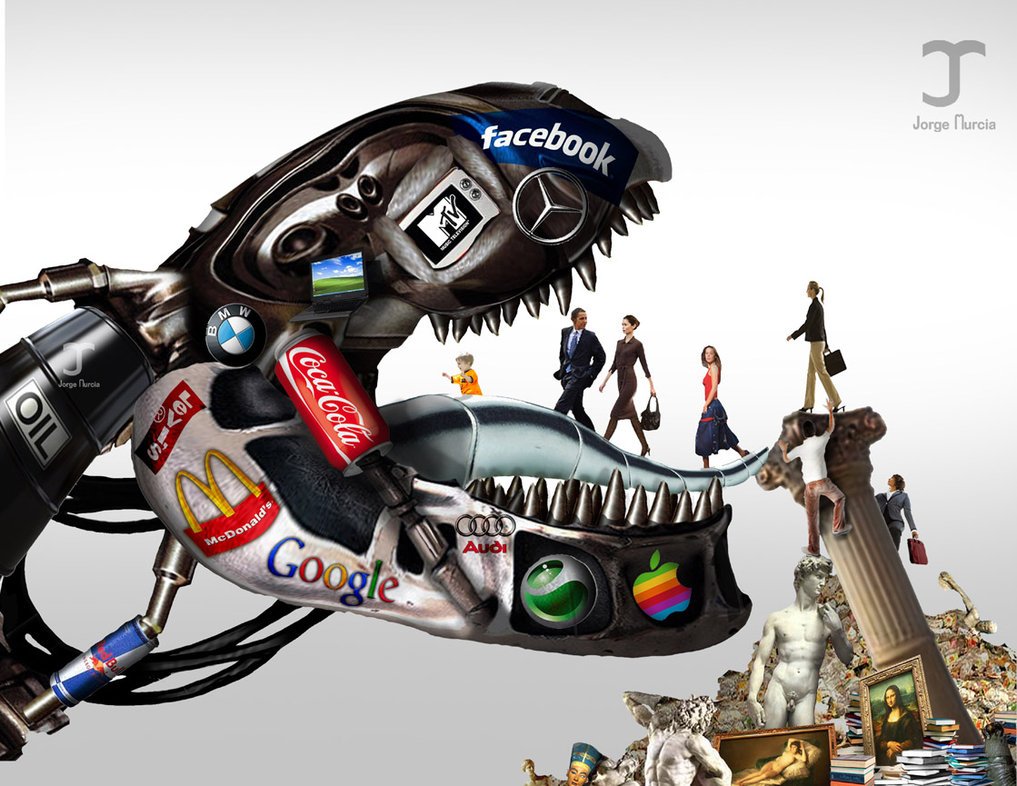
Alienation and destruction are just natural consequences of a highly inhumane system. Inside it, everyone is doomed, and the most vulnerable are just the first in the long line of “superfluous” people…
Ljubodrag Simonovic: The Last Revolution
Contents
- Life-creating mind against destructive mindlessness
- The nature of Marx’s critique of capitalism
- Marx’s conception of nature
- Capitalist exploitation of soil
- “Humanism-Naturalism”
- Marx and capitalist globalism
- The cosmic dimension of man
- “Alienation” and destruction
- Destruction of the body
- Homosexuality
- Capitalist nihilism
- Productive forces
- Dialectics and history
- The integration of people into capitalism
- Technique as myth: Zeitgeist fascism (Part 15a) •|• Technique as myth: Zeitgeist fascism (Part 15b)
- Contemporary bourgeois thought
- Politics as a fraud
- Contemporary critique of capitalism
- Bourgeoisie and proletariat
- October revolution
- Contemporary socialist revolution
- Revolutionary violence
- Vision of a future
- Notes
The Last Revolution -- Chapter Eight
“Alienation” and destruction
(Translated from Serbian by Svetlana Đurić)
“Alienation” is a basic concept upon which Marx’s critique of capitalism is founded, and “de-alienation” is a key idea upon which the libertarian intention of his critique of capitalism and his vision of the future are based. Capitalism’s becoming a totalitarian order of destruction rendered Marx’s concept of “alienation” insufficient to providing the opportunity for the establishment of an adequate starting point for a critique of capitalism. Man’s contemporary alienation has not merely an inhuman nature, but a destructive nature as well. It implies the obliteration of nature as a life-generating whole, of man as a biological and human being, and of the emancipatory legacy of national cultures and of civil society, that is, of the visionary mind and the idea of novum. By the annihilation of cultural and libertarian consciousness, the possibility of man’s becoming aware of his own alienation and establishing a critical and change-creating remove from capitalism is destroyed.
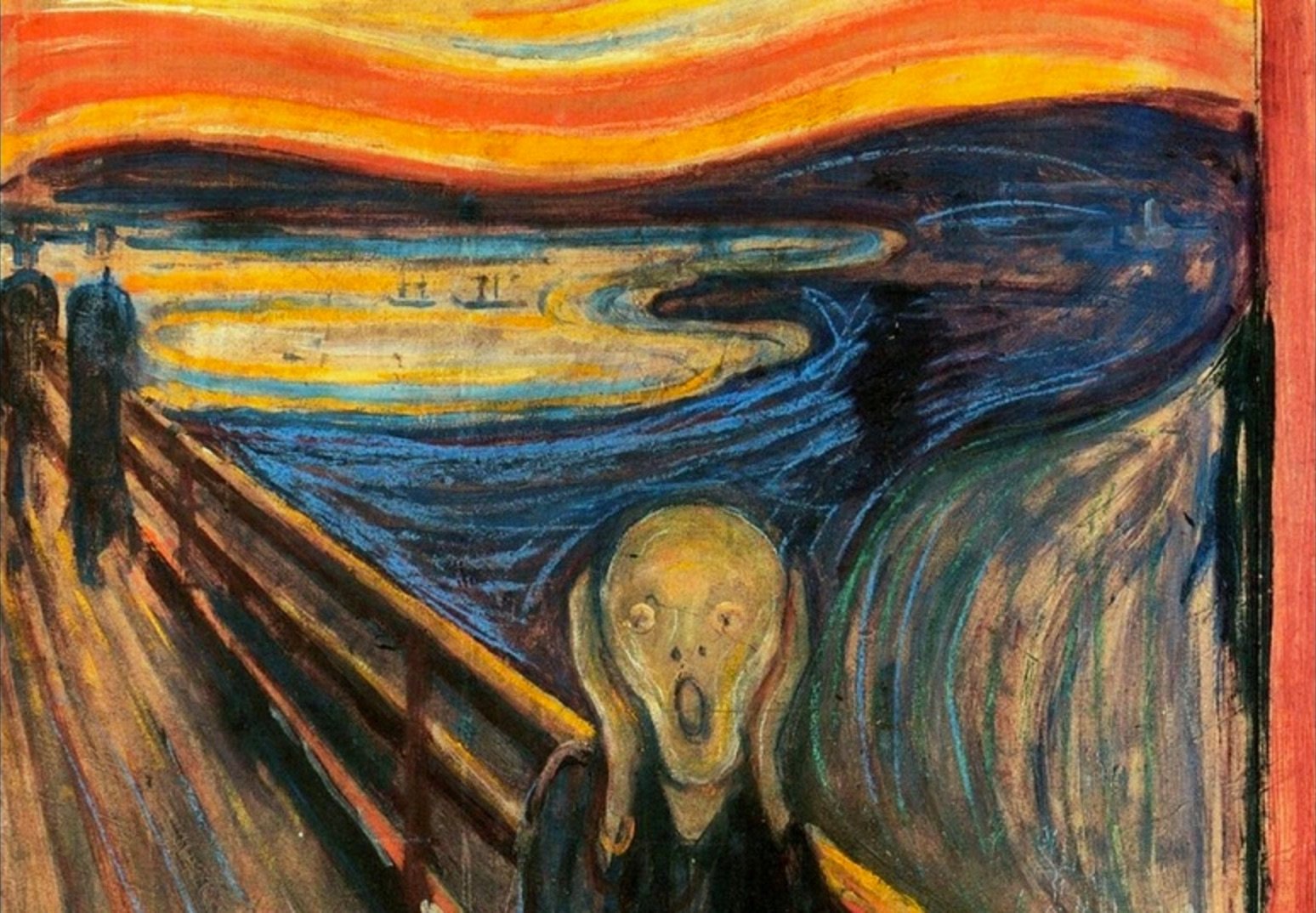
When capitalism became a totalitarian order of destruction, not just private property, labor and the market, but even life, itself, became means for man’s alienation from his natural and human being. Unlike the previous ruling classes, the bourgeoisie endeavors to amalgamate not only its own values but also its life-sphere into the working world. A worker is not merely a producer, but a consumer of commodities, as well, and, as such, a creator of the market, that is, an instrument for solving the crisis of over-production. Destructive consumer practices have become the dominant form of the man’s living activity and the principal mode for entrapping the worker in the existential orbit of capitalism and its values. “Consumer society” becomes a totalizing power that spares no one and that no one can escape. Commercialization of life is the worst form of totalitarianism that has ever been created in the course of human history because it completely subordinates nature, society and man to the destructive machinery of capitalist reproduction. Its essence is encoded in the monstrous maxim “Money does not stink!” which also expresses the essence of ecocidal capitalist barbarism.
In Marx, humanity, which primarily implies freedom and creativity, represents the most important quality of man, the quality toward which the concept of “alienation” is applied. It is possible for man to be, in his essence, a human being: man can become inhuman precisely because he is a man. According to Marx, though humanity can be suppressed and degenerated, it cannot be annihilated. In spite of being manipulated and repressed, in Goethe’s words: “…a good man in his inarticulate impulse is entirely aware of his true course”. The concept of man’s “alienation” is manifested in relation to the possibility of his “de-alienation”, which means, in spite of the capitalist totalization of life, capitalism cannot succeed in obliterating the humanity within man, so that, at an appropriate historical moment (an economic crisis of capitalism) it can be manifested in the form of revolutionary consciousness and practice. “De-alienation” represents a universal principle and implies man’s liberation from the inhuman role which capitalism imposes on him. It is of crucial importance that Marx’s idea of “alienation” refers to the fact that under capitalism man becomes alienated from his own humanity by being alienated from his authentic human potential, alienated from what he can become as a universal creative being. Each man carries inside the unlimited potential of humanity – this is Marx’s most important humanistic message and represents the basis of his vision of the future. As for the capitalist, he, being a capitalist, cannot become a human being unless he, as a man, does not emancipate himself from capitalism, which is done primarily by ensuring his own existence through his own work. The elimination of class distinctions and class relations does not merely imply the reinstatement of the worker to his authentic human being, but also a return of the capitalist to his own state of being a man. The socialist revolution, by means of which the elimination of class society based on the private ownership of the means of production takes place, also deprives capitalists of their inhumanity: capitalists do not exist without capitalism. The objective of the socialist revolution is not to exterminate capitalists, but to bring an end to class society and to create such social relations as would make it possible for each man to realize his authentic human capacities in the community of others.
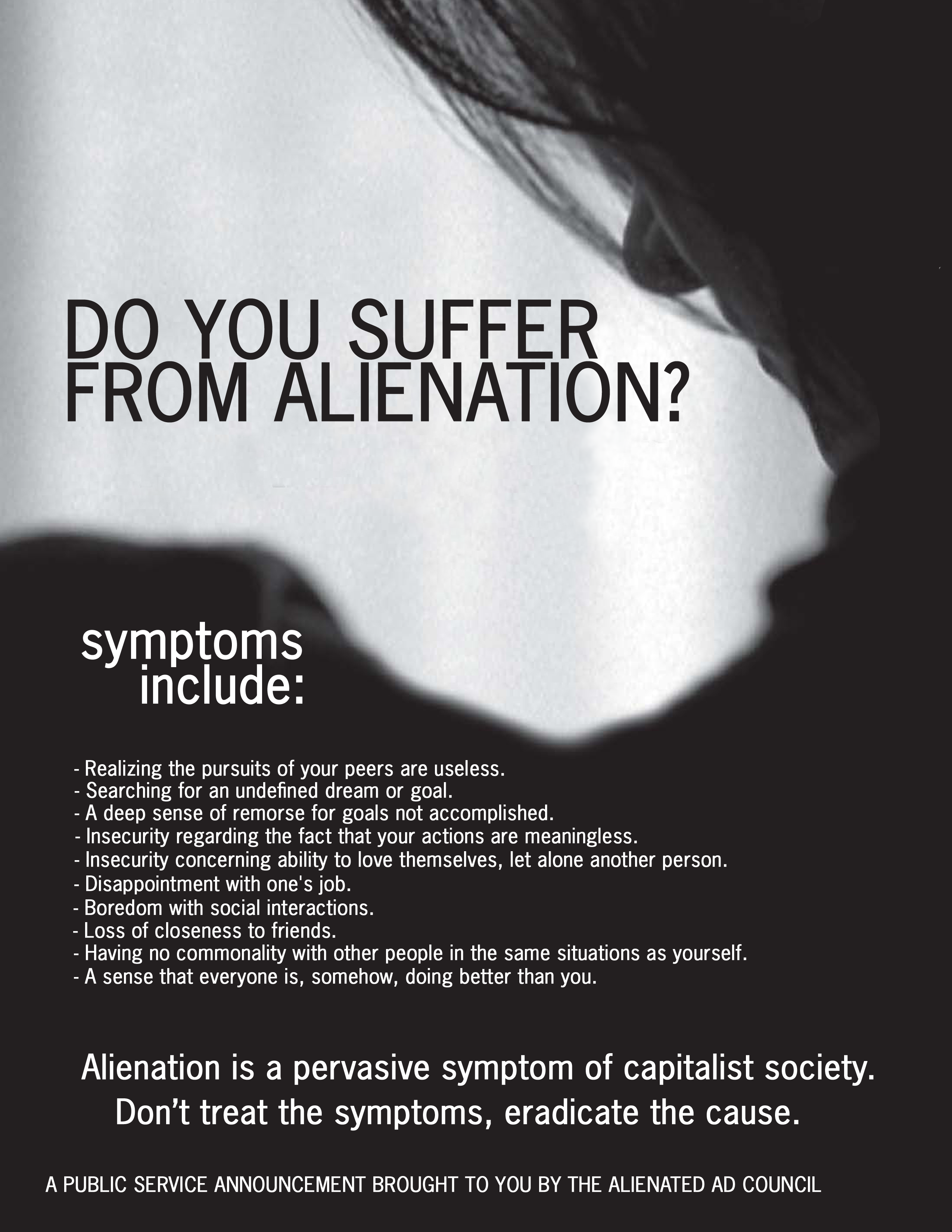
In light of the prevailing tendency in the development of capitalism, instead of Marx’s concept of “alienation”, the idea of destruction should become the starting point in the critique of capitalism. This idea provides an opportunity to perceive the most significant and, for humankind and the living world, the most ruinous possibilities of capitalism. The concept of destruction does not merely define the status of man under capitalism and his relation to nature as an object of labor and the “anorganic body” (Marx) of man; it also describes the relation of capitalism to the living world, to nature as an ecological whole, and, in that context, to man as a biological and human being. Capitalism does not only alienate the natural world from man, but, by destroying it, also turns nature into man’s mortal enemy. It is not alienation, but the destructiveness of labor that is dominant in capitalism; it is not the processing but obliteration of nature; not the suppression of man’s erotic nature and the coarsening of his senses, but the degeneration of man’s human and biological (genetic) being; not only making man look foolish, but wiping out his mind… As it becomes more and more a totalitarian order of destruction, capitalism nullifies any possibility of a conflict between the human and the inhuman by destroying the human and thereby eliminating the possibility of alienation: the less man remains man, the smaller is the possibility of his alienation from himself as a man.
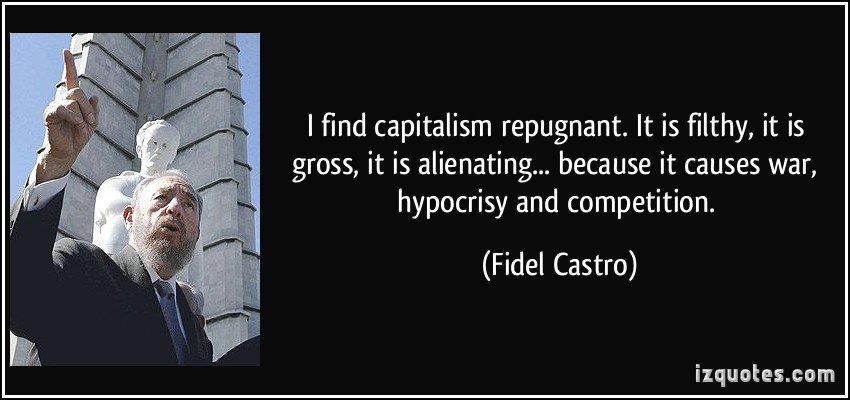
The development of capitalism as a totalitarian order of destruction poses the question: can capitalism so degenerate man as to remove absolutely all his human characteristics? Considering the destructive madness prevalent in the most developed capitalist countries, it is not unreasonable to conclude that capitalism has exceeded the anthropological limits imagined by Marx with his concept of “alienation”: that it would merely succeed in degenerating man to such an extent that his destructive “needs” would turn into the power that motivated him and provided meaning to his life. It is not merely man’s “alienation“ from his human essence, but his degeneration as a human and biological being. Capitalism not only dehumanizes man, but it also denaturalizes him, deprives him of the characteristics that are distinctive to living beings. Capitalism does not merely compel man to act like a mechanical part of the industrial labor process, thereby distorting him physiologically, as Marx claims, but it also deforms him genetically and mutilates him as a living being. It is a capitalistically caused mutation of man from a natural and cultural being into a destructive working (consuming) machine. The “reification” of man by the capitalist market was also followed by his being turned, as worker and consumer, into an accomplice in the destruction of the world. Destruction became an authentic need of the capitalistically degenerated man.
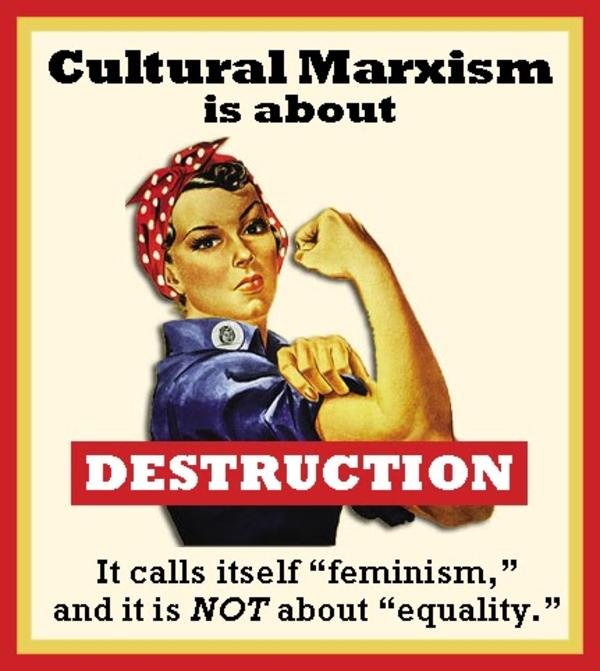
Life based upon destructive capitalist totalitarianism has become the cause of physical and mental degeneration among people. “Consumer society” forces man to adapt to the ruling order through destructive consumer activity which “solves” the crisis of over-production with an ever more intensive destruction of commodities (dynamics of destruction), thus clearing new space in the market. In the most immediate way it conditions the way of life, the mentality and the value-horizon of the contemporary (petit) bourgeois. The difference between “classical” and the contemporary capitalism is that contemporary capitalism disfigures and degenerates people not only by reducing all human necessity to the “need to possess” (Marx), but also to the need to destroy. “Possession” implies the permanent ownership and exploitation of assets. Durability, which once represented the highest quality of commodities, in a “consumer society” has become the largest obstacle to renewed demand and the growth of capital. Goods (commodities) are no longer a fetish, as Marx claims, but it is destruction, itself, that has become the fetish. Capitalism turns man’s life-creating (erotic) energy into a drive for destruction. It thus destroys authentic sociability and creates destructive sociability. Destroying the largest quantity of goods in the shortest time has become the ultimate goal for the contemporary capitalist fanatic. During the 2011 New Year’s sales, a commercial slogan appeared at one London shopping center: “I shop, therefore I am!” This grotesque knock-off of Descartes’ maxim, cogito ergo sum, unequivocally indicates the nature of the contemporary capitalist degeneration of man. The ultimate and most ruinous result of the development of the “consumer society” is the destruction of man as a reasoning being and the turning of the human community into a crowd of destructive capitalist fanatics.

Marx emphasizes that capitalism develops universal human needs, and in the Economic and Philosophical Manuscripts he claims that capitalism reduces all human need to the need for possession: “Private property has made us become so dull and one-dimensional that an object becomes ours only when we possess it, that is, only when it exists as an asset for us or when it is directly possessed, eaten, drunk, worn, inhabited, etc., by us, in a word, used. But private property, itself, sees these direct realizations of possession merely as a means to a living, but the life for which they should be instrumental is a life of private property, work and capitalization. (…) All physical and spiritual feelings or sentiments are replaced by alienation from all those sentiments, by the sentiment of possession. The human being had to be reduced to this abject poverty in order to engender an inner richness within itself…” (15) What is this “inner richness“ that man brings “forth out of himself” when capitalism reduces him to “absolute poverty”? This wordplay, based on libertarian optimism within which humanity becomes an abstraction, conceals the truth that capitalism can degenerate man to such an extent that he loses his humanity, a quality without which he will have no need for justice and freedom and, therefore, will not fight for a righteous and free world. Marx could, however, have developed his critique to its completion by situating the issues in such a manner as to conclude that capitalism completely degenerates man and thus eliminates any possibility of dеalienation, even the very possibility that man could create a new world. In that way, the anthropological limit would have been surpassed and so the appeal to struggle against capitalism would be pointless. According to Marx, in spite of the fact that man is alienated from his own self, in the depths of his being the flame of humanity continues to burn and will flare and pervade the entire world with its brilliance and warmth, encouraged by the common struggle against capitalism and for a human world. Indisputably the vision of the future should be based on faith in man, but also on an awareness that capitalism is capable of destroying the human within the man.
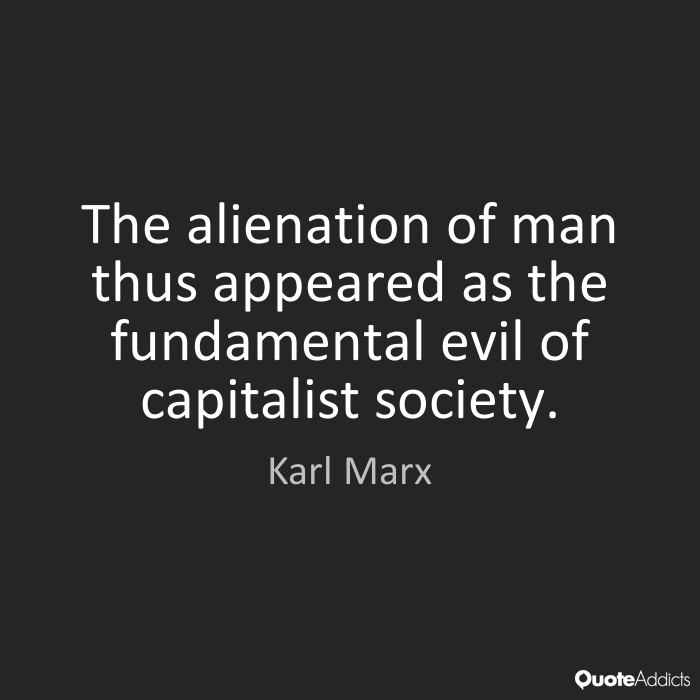
Marx claims that man under capitalism is alienated from himself and is subjected to reification, that labor degenerates him, etc., while, at the same time, claiming that capital produces a “universality” the limits of which are within its own nature. Marx states: “Universality, toward which capital strives irresistibly, finds in its own nature those limits that, at a certain level of its development, will result in a cognition that it represents the major limitation of that endeavor and will, therefore, force it to self-eliminate.” (16) Marx fails to notice the real nature of capitalist universality and does not distinguish universality in the technical sense from universality in the humanistic sense. A variety of technical ways of processing nature do not, per se, imply development of man’s universal creative capacities and an opening of the space of freedom. Capitalism does not develop man’s universal needs, but the universal forms of manipulation of man that are essentially dehumanizing and denaturalizing. It annihilates man’s authentic needs and the very possibility of having his own needs, and imposes on him the “needs” and the manner in which they are fulfilled so as to degenerate him both biologically and mentally. Capitalism generates man in its own image – turns man into a destructive being, and turns his potential universal creative capacities into universal destructive powers. Marx speaks about “universality toward which capital irresistibly strives”, however, this is not about the development of authentic human needs and capacities, but, eventually, about the development of consumer standards that degrade the quality of life and thus degenerate man as a universal life-creating being. Capitalism produces false, repressive and destructive needs and thus turns man into a dehumanized producer and a destructive consumer. The smaller man’s spirit, the more inadequate are interpersonal relations – it results in a stronger need to destroy objects, both natural and human. There is a real risk that capitalism will degenerate man to such an extent that he will not be, nor want to be, in position to confront the destruction of life.
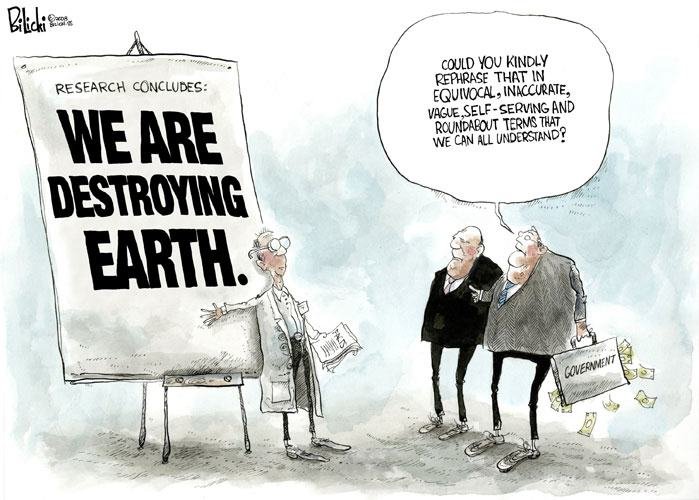
Capitalism does not only deprive man of his historical, but also of his natural homeland. It exhausts nature as a raw material and energy resource in such a way as to denaturalize it and thus denaturalize and dehumanize man. An overwhelming majority in the most developed countries live and work in spaces that have become technological cages and in towns that have turned into capitalist concentration camps. Inside them the capitalist degeneration of nature, of life and of man has reached its apex: man is “illuminated” by artificial light, inhales polluted air, drinks polluted water, eats toxic food, lives a life that corrodes the connection between man and nature and his own natural being… At the same time, the annihilation of nature as man’s “anorganic body” (Marx) implies a destruction of the body as a life-creating whole, of the senses, the nervous system, the organism’s natural rhythm of work, of its reproductive capacity, the body’s creative potential… Capitalism creates a perverted world and a man that matches such a world and who, as a perverted being, is not in position to discern what is good and what is bad; what he does and does not need… The capitalist petit bourgeois is a capitalistically degenerated “Alice in Wonderland” who no longer perceives wonders as wonders because she has lost her own ability to reason and, with it, the ability to wonder. The ruling propaganda machinery and the capitalist way of life induce man to perceive the world in an erroneous way; to experience the world in an erroneous way; to think in an erroneous way and, hence, to behave in an erroneous – destructive way. Everything becomes something different from what it actually is and what it could be, in a humanistic prospective. People who struggle for freedom become “terrorists” and those who terrorize the entire world become “saviors of humankind”; an insipid Coca-Cola becomes “The Real Thing!”; medications that kill people become “sources of health”; it is “normal” for people to be concerned about their team winning the football game, but they are not concerned about the survival of humankind and the living world… At the same time, capitalism creates virtual worlds in people’s minds. From early childhood people identify with characters from TV and computer screens and perceive their bogus and imputed lives as if it were their own. Only by means of his own physical body can man live in the actual world, and even that body has been degenerated by capitalism.
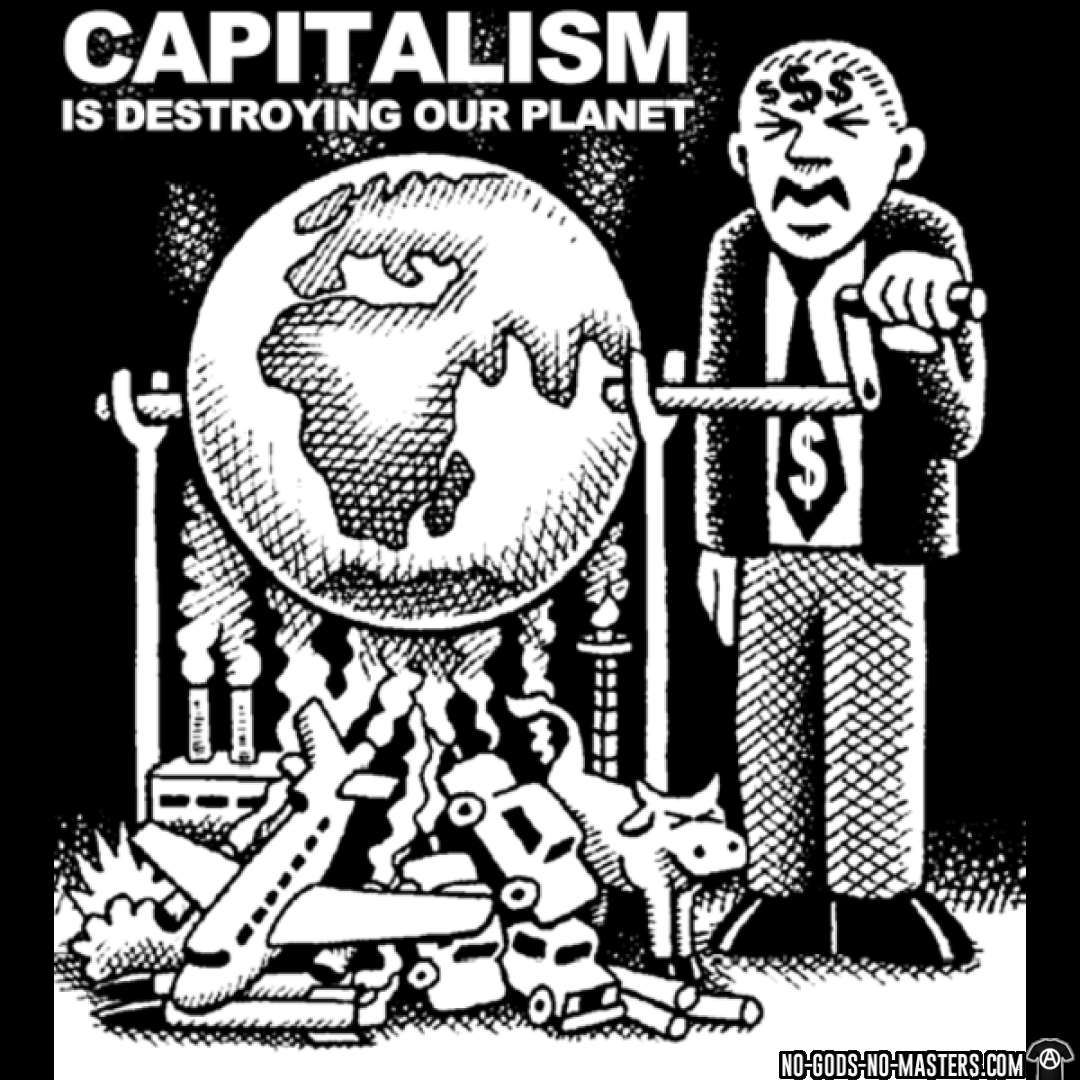
Not only does capitalism not develop universal human needs and abilities, it produces mechanisms for the universal liquidation of those needs that define man as a man. The most significant product of the capitalist advertising machine is not getting people to buy what is advertised, but the destruction of their ability to reason and turning them into an idiotized consumer crowd. One of the major characteristics of the capitalistically degenerated petit bourgeois is that he does not look at the world with his own eyes and does not think with his own brain. Depriving man of the ability to reason is not merely of economic importance but also of significant political importance. It enables the capitalist oligarchy to impose on the people, through the techniques of advertising, not only political and economic programs that are antithetic to their human interests, but also a way of life that leads to the destruction of the natural and social foundations of their own survival. At the same time, the very consumer way of life has become a capitalistically degenerated form of man’s realization as a political being. Living the consumer way of life is the most significant way the man expresses his loyalty to capitalism. By posing an elementary, reasonable question: “Why should I buy something I do not need?” – man proves that in spite of everything, he still exists as an autonomous human being and thus derogates capitalism as a totalitarian destructive order.
There is an increasingly realistic risk that capitalism might pervert man to such an extent that he will not be able to understand the world and relate to it as an authentic natural human being. The growingly intensive process of impoverishment and the technicalization of the language that has degenerated the process of thinking and reduced the possibility for any expression of humanness and, thus, any development of interpersonal relations, also contribute to this. People are not capable of distinguishing the apparent from the essential, the fake from the genuine, the crucial from the marginal, the cause from the trigger, the past from the history, the otherness from the novum, equality from uniformity, the intelligentsia from the reason, the formal-logical from the dialectical, progress from progressivism, the virtual from the true, the real from illusory, the just from the legal, the utopian from utopistic… At the same time, the cultural heritage of humankind becomes inaccessible to an increasing number of people because they are not able to understand it and appreciate it. The fact is that people’s minds are not dwarfed, but rather capitalistically degenerated. This primarily goes for the “technical intelligentsia” that holds a stake in capitalist “progress”. Finally, it is about distorting people’s minds and rendering them as destructive capitalist idiots.
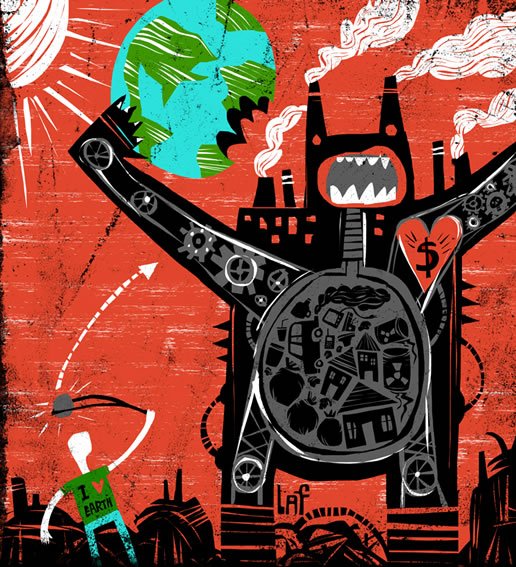
In the so-called “post-industrial society”, forms of physical labor that have required man to perform unduly exhausting and degenerating physical activities have, with the development of science and technology, been to a great extent overcome. At the same time, the processes that degrade man as a human and biological being have been intensified, primarily with the advent of the consumer way of life. The annihilation of “traditional humankind” is ongoing and involves the elimination of human concerns like love, solidarity, fondness, aesthetics, commitment, wisdom, parental affection and care, historicity, libertarianism, authentic sociability… An immediate product of the “consumer society” is the “consumer-man”, contained within the “consumer-body”. Capitalism ruins man’s body and turns him into a destructive machine by causing hypertrophy of those corporal functions that provide opportunity for development of consumer processes, and atrophy of those functions of the organism that cannot be rendered profitable. Capitalism has become a one-dimensional destructive order and, as such, produces “one-dimensional” (Marcuse) destructive man. At the same time, capitalism degenerates people mentally. Tens of millions of citizens in the West suffer from depression, anxiety, and other mental illnesses, which have become the causes of most serious forms of social pathology. Sport is an area in which the capitalist destruction of the human and the natural have reached a totalitarian and spectacular dimension. The individual who is not prepared to eliminate his “adversary”, along with his own body, has nothing to look for in sport. Sport produces robotized gladiators, stuntmen and circus acrobats, who, being actors in the sport’s show-business, are tasked with depriving people of their cultural and libertarian self-awareness and turning them into capitalist zombies. The sport spectacle is a commercial for a capitalistically degenerated world.

Capitalism deprives man of humanness and naturalness in order to turn him into an “ideal consumer” who will, without objection, consume the ever-growing quantities of toxic goods produced by the capitalist machinery of death. In that context, the contraposition of the wish to the will is being eliminated by the nullification of man’s authentic needs and his ability to make his own decisions and, thus, his will to act in accordance with his genuine needs and desires. Capitalism turns man into a consumer-destructor by developing his “normal” needs up to a self-destructive level, and by generating “new needs” for the sake of mere market expansion (fields of destruction). These needs are met in such a technical way as to cause man growingly to perceive himself as a robotized rather than a natural and human being. The intensity of the impulsion to fulfill these needs is determined by the demands of capital and, eventually, by the dynamics of its valorization and accumulation. Capitalism rescinds the possibility of man’s meeting his natural and human needs in a human way, and develops in him artificial needs of a commercial nature that are, actually, presented as compensation for the impossibility of his realizing his genuine needs as a social and creative being. In that context, capitalism not only produces excesses of commodities with use-value, but it creates increasing quantities of goods without any use-value. Generating a need for that which is needless is the most important job of the advertising industry. At the same time, it is necessary to create an interest in the marginal that can be expressed in the form of spectacle, becoming merely a publicity package aimed at making the marginal seem providential, so that such issues as are actually significant to man’s future can be marginalized and, thereby, eliminated from the public (political) sphere.
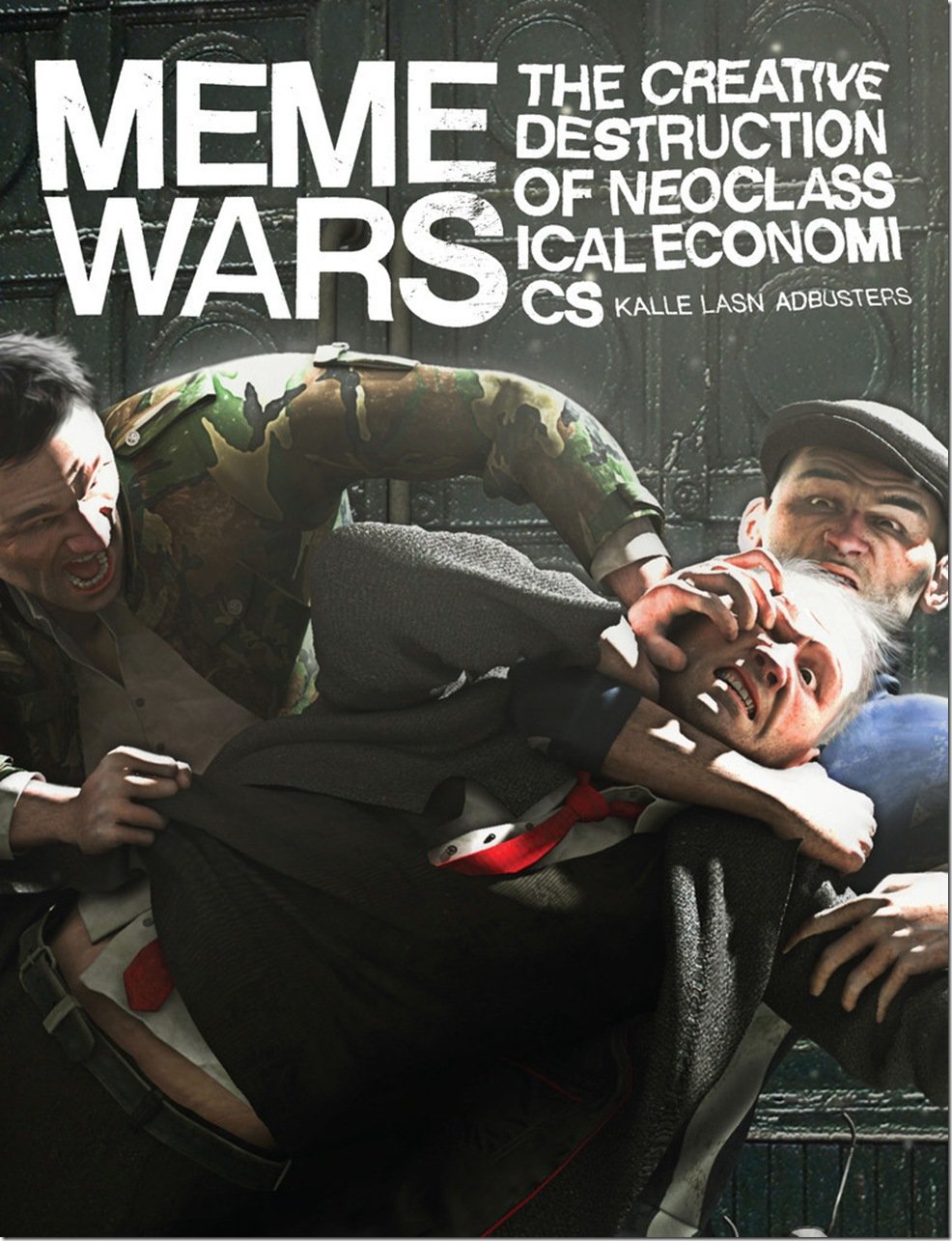
Reshaping destructive needs into a propulsive energy for the creation of a market and, thus, for capitalist development, represents the basis for the establishment of a normative model according to which man’s being is determined. Everything is evaluated based on a value model created by the propaganda machinery of the “consumer society”. Whatever jeopardizes the development of capitalism is eliminated from the public attention and is given a marginal and distorted position, while the capitalist model of an “exemplary citizen” becomes a determining criterion for the “socially acceptable”. Anyone who seeks to relate to the world in a reasonable way, guided by his authentic natural and human needs, is cast out as a “lunatic”. The image of a “healthy man”, as created by the capitalist propaganda machinery, is not that of a man who does not require health care services and medication, but of a man who consumes an increasing quantity of more and more expensive medical products and is constantly under treatment by physicians. The same goes for beauty. The notion of the “beautiful” is not associated with the genuinely natural or spiritual, but with increasingly expensive medical products and treatments. Women who do not use the (more and more toxic) products for their bodies and faces and do not choose to undergo surgical interventions (which more and more often have a fatal outcome) become the embodiments of “ugliness”.
Distortion of people by the consumer way of life and a denaturalized environment is in progress. It is not merely the ruination of the worker’s health, something described by Marx, but a genetic distortion of man. Capitalism not only alienates man from his own natural and human existence, but also annihilates man as a natural and human being. It is not just “suppression” of authentic human needs, but a capitalistically induced mutation of man. Capitalism produces “needs” which have a destructive nature and are “fulfilled” in a destructive way. Turning the need for life into an exigency for destruction is the final form of the capitalist degeneration of man. Capitalism transforms the inherent vital aggressiveness of man as a living being into the need for destruction and thus enables the development of the destructive potential of capitalism. Destructive needs become the propulsive energy for the development of capitalism. The “need” to destroy things; the “need“ to torture his own body and to ruin it by the means of a devastating training and doping regime; the “need” to make his “partner” suffer in order to have an orgasm; the “need” to abuse children and the helpless; the “need” to destroy nature and all that lives; the “need” to eat excessively and compulsively, to drink, to use narcotics… – these are all destructive forms of man’s alienation from himself as a libertarian, creative, erotic, emotional and social being. At the same time, these are compensation-mechanisms by which man desperately attempts to “solve” the problem of loneliness, of existential fear, depression, hopelessness … – and, in so doing, only exacerbates the causes of human misery. Today, being a conformist means adapting to capitalism as a destructive order and thus becoming a destructive being.
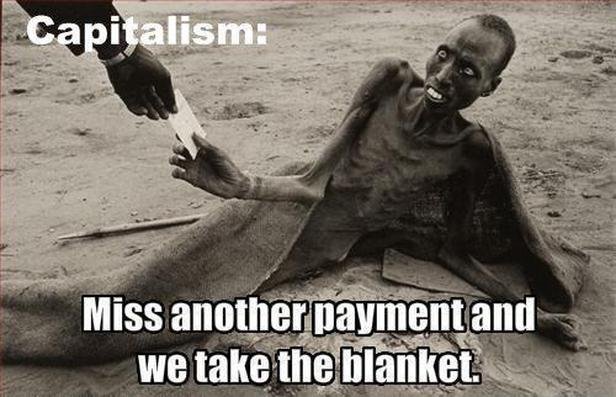
The oppression of the weak is one of the most inhuman way by which the slaves of capitalism identify themselves as complicit with a ruling order that is founded in the instrumentalized repression unto liquidation of individuals. The images of violence seen on TV and computer screens every day, in which violence is presented in a technical-fantastic and spectacular way – contribute to this. Suppression, abuse, humiliation, torturing, assassination, destruction… these are the scenes that accumulate in man’s subconscious mind beginning in early childhood, and which inevitably condition his relations with others. At the same time, people are, from early childhood, deprived of love and respect, resulting in the formation of a pathological personality and the development of sado-masochistic character.
Children are the prime victims of capitalism. The most important strategic goal of the ruling capitalist clans in the West is the elimination of the billions of “superfluous” people. The children are the first targets. That is the overriding “trend” in contemporary capitalism: to kill the children. To kill them in every possible manner: by starvation, by dehydration, with viruses, bombs, vaccines, weapons, exhausting labor, radiation, daggers, scalpels… More than thirty thousand children die in the world every day. And “overpopulation” (that is: “the global proliferation of the poor”) is presented as the “key cause of global decline”. So, children should be put to death in the largest possible numbers – and ruthlessly. The American bombing of Korea, Vietnam, Iraq, Bosnia & Herzegovina, Serbia, Libya, Afghanistan… – using toxins, fragmentation bombs and missiles filled with depleted uranium, was intended not only to kill millions of people, but also to contaminate the environment and thus cause mass mortality among infants and the genetic destruction of the general population.
In the most developed countries of the West, pedophilia has reached the level of an epidemic. Each year millions of girls and boys become victims of sexual abuse. In the USA one girl in four and one boy in six are raped, and more than 100,000 girls a year are abducted and forced into prostitution in brothels for pedophiles (Der Spiegel, 26/6/2012). Why does the American administration not eliminate this evil that, every day, in special brothels for children, forces hundreds of thousands of little girls to be raped and reduced to sexual slavery? What good are the 3200 secret service agents and millions of policemen, private security guards and soldiers, the tens of millions of cameras, a totalitarian system of wiretapping and e-mail surveillance – if citizens cannot be protected and the criminal gangs eliminated? At the same time, sexual violence against children with physical and mental disabilities (children with impaired eyesight or hearing, and children with developmental difficulties) and orphans – has reached horrendous proportions. In those cases, “high officials” of the Catholic Church are the leading perpetrators. In February 2012, Der Spiegel published an article describing how a trial was held in Braunschweig (Germany) for a catholic priest who confessed he had committed 223 rapes (!) and 57 other forms of sexual violence against children, between 2004 and 2011. From WWII until now, representatives of the Christian clergy in Western Europe and the USA have raped hundreds of thousands of the disabled children entrusted to their care. Thousands of monsters in canonical robes have not only gone unpunished, but are still performing their “pastoral duties” all over Europe and the USA, continuing to abuse their “flocks”. The fact that each year tens of thousands of children are slaughtered by specially trained gangs in order to “harvest” their vital organs for resale on the black market through renown clinics in the West where doctors will transplant them into those patients who can afford to pay for the procedures – this fact describes the real nature of the “free world”. Abduction of infants by the Catholic Church (more than 300,000 such cases in Spain alone); killing unborn babies and selling off their remains to American and European pharmaceutical companies that render them into “superfine skin-care creams” (South Korea, Albania…); the ruthless exploitation of tens of millions of children around the world by the American and European companies; the monstrous abuse of children in sports… – these are all “details” that indicate the real nature of Western “democracy”.
The contemporary “will to power” (Nietzsche) has become the will to absolute power over the people and over nature and is the expression of the man’s complete deprivation of humanness and naturalness. It is not just the will to subjugate, but also the will to destroy the people and the living world. It is based on the nature of capitalism as a totalitarian order of destruction and is instrumentalized with the destructive power of technology. Capitalistically degenerated man fantasizes about being on top of the pyramid of a totalitarian and destructive power. Capitalism imposes destruction as the predominant model of behavior and, thus, creates man’s (self)destructive nature and his destructive “sociability”. To find “delight” in sporting events, where in physically and mentally damaged people fight for victory and for records, risking the destruction of their rivals and doing irreparable damage to their own bodies, implies there is an audience that has been similarly disfigured as human beings. At the same time, man experiences “freedom” by brutally expressing an un-freedom and thereby destroying himself as a libertarian and social being. A typical example is the “cheering” in sports stadiums. Man as “fan” is being turned into an idiotized member of the cheering “throng”. “Anything Goes!” is not an expression that affirms man’s freedom, but an acknowledgement of the total irrelevance of humanness and the present descent into the worst sorts of barbarity.
The Last Revolution (Part 7) << Previous • Part 8 • Next >> The Last Revolution (Part 9)

